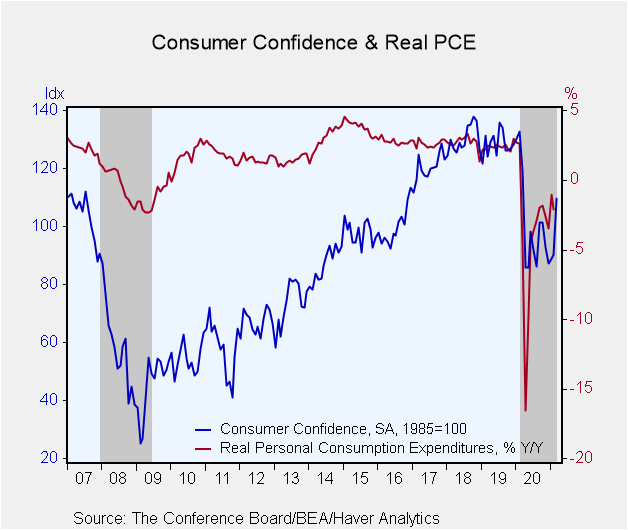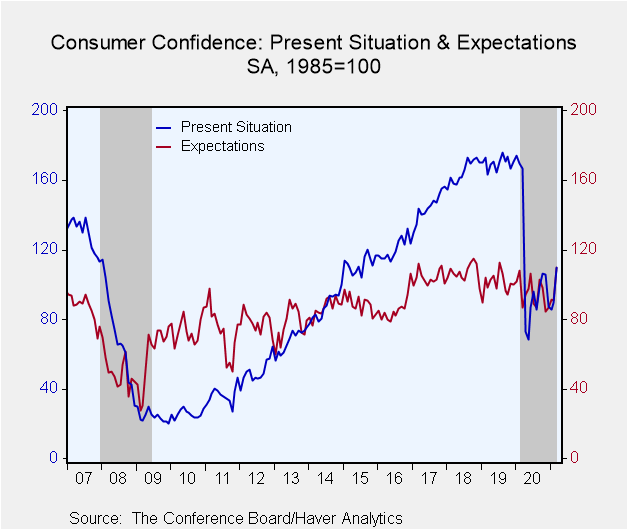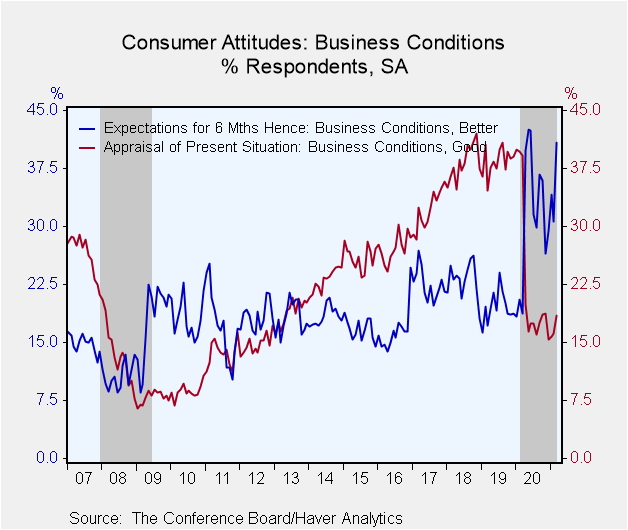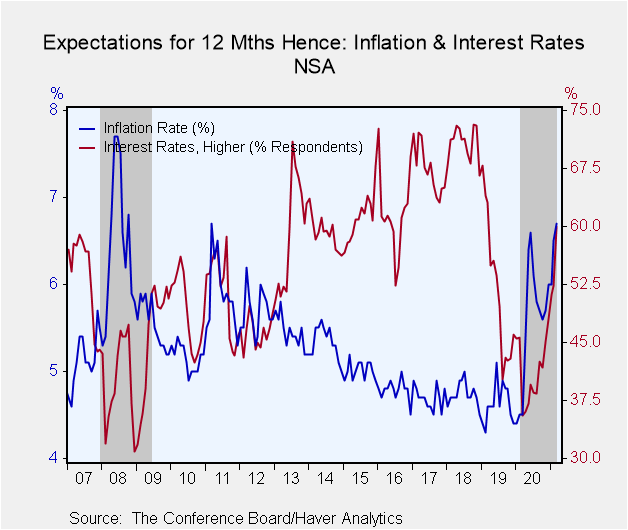 Global| Mar 30 2021
Global| Mar 30 2021U.S. Consumer Confidence Unexpectedly Surges During March
by:Tom Moeller
|in:Economy in Brief
Summary
• Consumer confidence improvement accompanies COVID-19 shots & stimulus checks. • Current conditions and expectations readings improve. • Job market index strengthens. Consumers' willingness and wherewithal to spend strengthened this [...]
• Consumer confidence improvement accompanies COVID-19 shots & stimulus checks.
• Current conditions and expectations readings improve.
• Job market index strengthens.
Consumers' willingness and wherewithal to spend strengthened this month. The Conference Board Consumer Confidence Index jumped 21.3% (-7.7% y/y) to 109.7 during March from 90.4 in February, revised from 91.3. It was the highest reading in twelve months, up from last April's low of 85.7. A lesser improvement to 96.5 had been expected in the Action Economics Forecast Survey.
The reading of the Present Situation index jumped 22.8% (-34% y/y) to 110.0 after edging higher to 89.6 in February. The index reached a high of 176.0 in August of 2019. The Consumer Expectations reading strengthened 20.6% (26.3% y/y) this month to 109.6, the highest level since July 2019.
The jobs gap, representing the difference between respondents indicating that jobs are plentiful and those saying jobs are hard to get, improved to 7.8% from -0.8%, suggesting greater improvement in the job market. This series has had a 79% correlation with the unemployment rate over the last ten years. The rise last month in the labor market differential occurred as the jobs plentiful measure rose sharply and the jobs hard to get index fell significantly.
Business conditions were perceived as good by an improved 18.5% of respondents. That remained below the 40.0% reading in January of last year. Expectations that business conditions would improve in six months jumped to 40.8%, the highest level in nine months. More jobs were expected in six months by an increased 36.1% of respondents, up from 27.4% in February. The percentage expecting income to increase edged slightly higher to 15.5% but was below the 20.0% reading twelve months earlier.
The expected inflation rate twelve months continued to strengthen to 6.7%, increased from 4.5% twelve months ago. The share of respondents planning to buy a new home jumped to 2.7% in March, the highest level since August 2002 and up from 1.0% in February. Those planning on buying a major appliance surged to 53.2%, the most in thirteen months.
Confidence of individuals in all age brackets improved sharply to twelve-month highs.
The Consumer Confidence data are available in Haver's CBDB database. The total indexes, which are indexed to 1985=100, appear in USECON, and the market expectations are in AS1REPNA.
| Conference Board (SA, 1985=100) | Mar | Feb | Jan | Mar '20 | 2020 | 2019 | 2018 |
|---|---|---|---|---|---|---|---|
| Consumer Confidence Index | 109.7 | 90.4 | 88.9 | 118.8 | 101.0 | 128.3 | 130.1 |
| Present Situation | 110.0 | 89.6 | 85.5 | 166.7 | 109.8 | 169.8 | 164.8 |
| Expectations | 109.6 | 90.9 | 91.2 | 86.8 | 95.2 | 100.6 | 107.0 |
| Jobs Gap (%) | 7.8 | -0.8 | -2.5 | 29.5 | 6.8 | 33.2 | 27.6 |
| Jobs Plentiful (%) | 26.3 | 21.6 | 20.0 | 43.3 | 27.8 | 45.8 | 42.0 |
| Jobs Hard to Get (%) | 18.5 | 22.4 | 22.5 | 13.8 | 21.0 | 12.6 | 14.4 |
Tom Moeller
AuthorMore in Author Profile »Prior to joining Haver Analytics in 2000, Mr. Moeller worked as the Economist at Chancellor Capital Management from 1985 to 1999. There, he developed comprehensive economic forecasts and interpreted economic data for equity and fixed income portfolio managers. Also at Chancellor, Mr. Moeller worked as an equity analyst and was responsible for researching and rating companies in the economically sensitive automobile and housing industries for investment in Chancellor’s equity portfolio. Prior to joining Chancellor, Mr. Moeller was an Economist at Citibank from 1979 to 1984. He also analyzed pricing behavior in the metals industry for the Council on Wage and Price Stability in Washington, D.C. In 1999, Mr. Moeller received the award for most accurate forecast from the Forecasters' Club of New York. From 1990 to 1992 he was President of the New York Association for Business Economists. Mr. Moeller earned an M.B.A. in Finance from Fordham University, where he graduated in 1987. He holds a Bachelor of Arts in Economics from George Washington University.
More Economy in Brief
 Global| Feb 05 2026
Global| Feb 05 2026Charts of the Week: Balanced Policy, Resilient Data and AI Narratives
by:Andrew Cates










